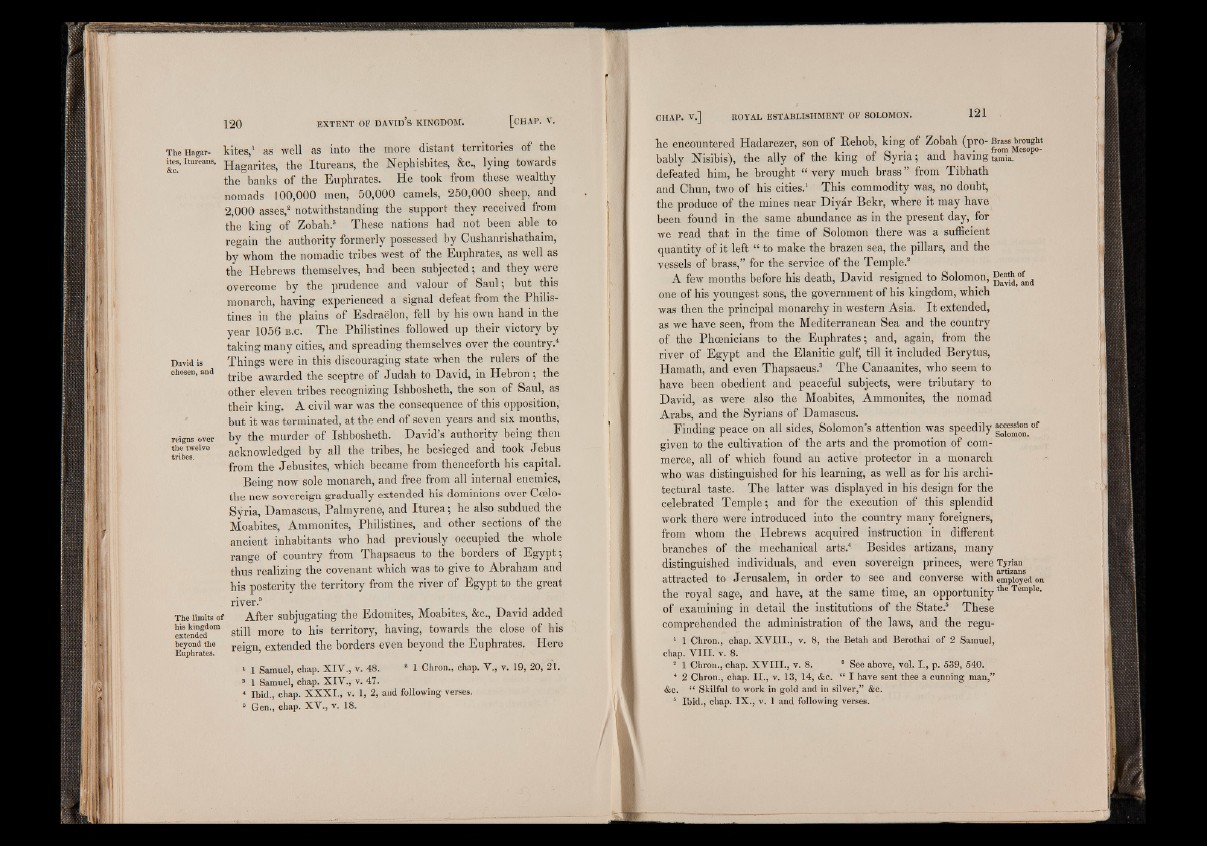
The Hagar- kites,1 as well as into the more distant territories of the
ites, Itui-eans, H a g a r i t e S ) the Itureans, the Nepbisbites, &c., lying towards
the banks of the Euphrates. He took from these wealthy
nomads 100,000 men, 50,000 camels, 250,000 sheep, and
2,000 asses,8 notwithstanding the support they received from
the king of Zobah.3 These nations had not been able to
regain the authority formerly possessed by Cushanrishathaim,
by whom the nomadic tribes west of the Euphrates, as well as
the Hebrews themselves, had been subjected; and they were
overcome by the prudence and valour of Saul; but this
monarch, having experienced a signal defeat from the Philistines
in the plains of Esdraelon, fell by his own hand in the
year 1056 b .c . The Philistines followed up their victory by
taking many cities, and spreading themselves over the country.4
David is Things were in this discouraging state when the rulers of the
chosen, and awarded the sceptre of Judah to David, in Hebron; the
other eleven tribes recognizing Ishbosheth, the son of Saul, as
their king. A civil war was the consequence of this opposition,
but it was terminated, at the end of seven years and six months,
reigns over by the murder of Ishbosheth. David’s authority being then
triteTlve acknowledged by all the tribes, he besieged and took Jebus
from the Jebusites, which became from thenceforth his capital.
Being now sole monarch, and free from all internal enemies,
the new sovereign gradually extended his dominions over Coelo-
Syria, Damascus, Palmyrene, and Iturea; he also subdued the
Moabites, Ammonites, Philistines, and other sections of the
ancient inhabitants who had previously occupied the whole
range of country from Thapsacus to the borders of Egypt;
thus realizing the covenant which was to give to Abraham and
his posterity the territory from the river of Egypt to the great
river.5
The limits O f After subjugating the Edomites, Moabites, &c., David added
extended01“ Still more to his territory, having, towards the close of his
beyond the - e j g n extended the borders even beyond the Euphrates. Here
Euphrates. & 9
1 1 Samuel, chap. X IV ., v. 48. 8 1 Chron., chap. V., v. 19, 20, 21.
3 1 Samuel, chap. X IV ., v. 47.
* Ibid., chap. X X X I ., v. 1, 2, and following verses.
5 Gen., chap. XV., v. 18,
he encountered Hadarezer, son of Rehob, king of Zobah (pro- Brass brought
n i i • c n • from Mesopo- bably Nisibis), the ally of the king of oyria *, and having tamia.
defeated him, he brought “ very much brass ” from Tibhath
and Chun, two of his cities.1 This commodity was, no doubt,
the produce of the mines near Diyar Bekr, where it may have
been found in the same abundance as in the present day, for
we read that in the time of Solomon there was a sufficient
quantity of it left “ to make the brazen sea, the pillars, and the
vessels of brass,” for the service of the Temple.8
A few months before his death, David resigned to Solomon,
one of his youngest sons, the government of his kingdom, which
was then the principal monarchy in western Asia. It extended,
as we have seen, from the Mediterranean Sea and the country
of the Phoenicians to the Euphrates; and, again, from the
river of Egypt and the Elanitic gulf, till it included Berytus,
Hamath, and even Thapsacus.3 The Canaanites, who seem to
have been obedient and peaceful subjects, were tributary to
David, as were also the Moabites, Ammonites, the nomad
Arabs, and the Syrians of Damascus.
Finding peace on all sides, Solomon’s attention was speedily | 6“s“°“ of
given to the cultivation of the arts and the promotion of commerce,
all of which found an active protector in a monarch
who was distinguished for his learning, as well as for his architectural
taste. The latter was displayed in his design for the
celebrated Temple; and for the execution of this splendid
work there were introduced into the country many foreigners,
from whom the Hebrews acquired instruction in different
branches of the mechanical arts.4 Besides artizans, many
distinguished individuals, and even sovereign princes, were Tyrian
attracted to Jerusalem, in order to see and converse with employed on
the royal sage, and have, at the same time, an opportunity*6 cmple-
of examining in detail the institutions of the State.5 These
comprehended the administration of the laws, and the regu-
1 1 Chron., chap. X V I I I ., v. 8, the Betah and Berothai of 2 Samuel,
chap. V I I I . v. 8.
8 1 Chron., chap. X V I I I ., v. 8. 3 See above, vol. I ., p. 539, 540.
4 2 Chron., chap. I I ., v. 13, 14, &c. “ I have sent thee a cunning man,”
&c. “ Skilful to work in gold and in silver,” &c.
5 Ibid., chap. IX ., v. 1 and following verses.